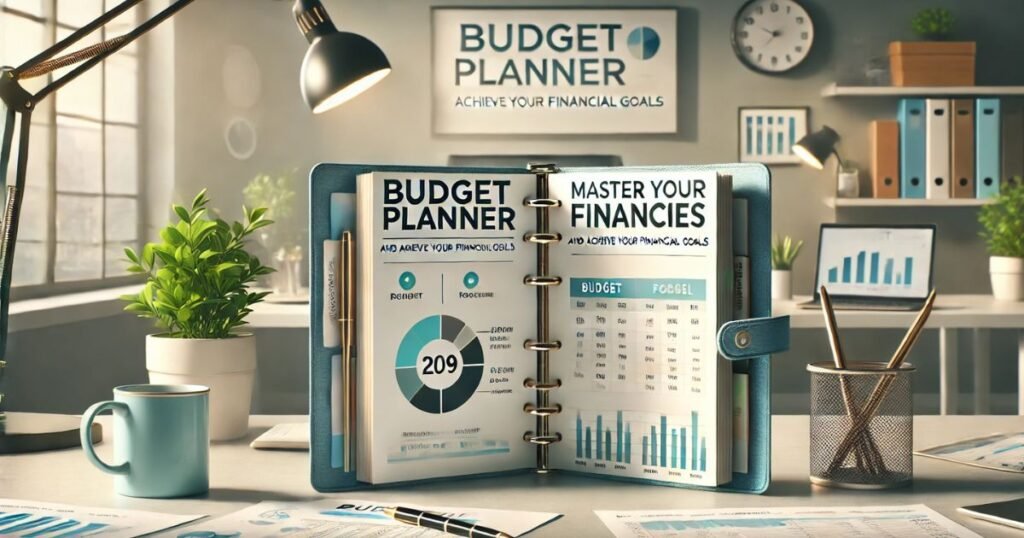A Budget Planner is one of the most effective financial tools you can use to take control of your money and set yourself on the path to financial freedom. Whether you’re striving to pay off debt, save for a large purchase, or simply manage your monthly expenses, a budget planner helps you track income and expenses with precision, ultimately helping you achieve your financial goals. In this article, we’ll explore how you can use a budget planner to manage your finances better and create a roadmap to financial success.
If you want to optimize your budget, reduce debt, and start building an emergency fund, a budget planner is your first step. By using effective personal budgeting strategies, you can stay on top of your finances, avoid overspending, and ensure that every dollar you earn works toward your long-term financial goals.
How a Budget Planner Helps You Master Your Finances
A budget planner is an essential tool for anyone serious about managing their money effectively. It provides you with clear visibility into your cash flow, allowing you to manage income, expenses, savings, and debt in one place. With a well-organized budget template, you can make informed decisions that help you reduce credit card debt, save for retirement, and even start building wealth through investments.
Below is a simple budget planner that illustrates how you can allocate your income across various spending categories:
| Category | Amount ($) |
| Income | 3,500 |
| Fixed Expenses | |
| Rent | 1,000 |
| Utilities | 200 |
| Insurance | 150 |
| Loan Payments | 300 |
| Variable Expenses | |
| Groceries | 250 |
| Transportation | 100 |
| Entertainment | 150 |
| Personal Care | 50 |
| Savings & Investments | |
| Emergency Fund | 100 |
| Retirement Savings | 100 |
| Debt Repayment | 200 |
| Total Expenses | 2,550 |
| Balance | 950 |
This simple budget worksheet helps you break down your monthly expenses and gives you a clear view of where your money is going. By using this type of tool, you can allocate more resources to areas that support your financial goals and reduce unnecessary expenses.
Why Is Budgeting So Important for Your Financial Health?

Budgeting is vital for several reasons. Without a clear financial plan, it’s easy to end up living paycheck to paycheck, accumulating debt, and not having enough saved for emergencies or future goals. Personal budgeting helps you regain control of your finances by highlighting areas of improvement and offering actionable steps to optimize your spending and savings habits.
1. Financial Control
A budget planner provides control over your finances by giving you a clear picture of your income versus expenses. When you know where your money is going, you can adjust your spending and prioritize your financial goals, including debt reduction, emergency savings, and retirement planning.
2. Debt Reduction
Using a budget planner helps you direct extra funds toward paying off high-interest debt, such as credit cards and loans. By focusing on debt repayment and reducing interest payments, you can accelerate your journey toward becoming debt-free.
3. Achieving Financial Goals
Whether you want to save for vacations, home purchases, college education, or retirement, a budget planner ensures that you set aside a portion of your income for each goal. This helps you stay committed to your savings targets and keeps you motivated to achieve your financial aspirations.
4. Emergency Fund
Unexpected events such as job loss, medical bills, or car repairs can be financially devastating without an emergency fund. A budget planner helps you allocate money for emergencies, allowing you to stay prepared for the unexpected and avoid going into debt when life throws you a curveball.
5. Avoiding Overspending
A budget planner allows you to set limits on non-essential spending, such as eating out, entertainment, or luxury purchases. By tracking your monthly spending, you can identify areas where you can reduce costs and direct the extra money toward your goals, such as building an emergency fund or paying off debt.
How to Use a Budget Planner Effectively
To make the most out of a budget planner, here’s a step-by-step guide on how to track your finances:
1. Track Your Income
Start by listing all sources of income, including salary, side income, and other cash inflows like investments or freelance work. Knowing your total income is the foundation of your budget, helping you allocate funds to other areas.
2. List Fixed Expenses
Fixed expenses are regular, predictable payments like rent, mortgage, utilities, and insurance. These need to be accounted for first in your budget since they don’t fluctuate. Prioritize these to ensure you have enough to cover your essential costs.
3. Account for Variable Expenses
Unlike fixed expenses, variable expenses like groceries, transportation, and entertainment can change from month to month. Keep track of these expenses and find ways to reduce unnecessary spending.
4. Set Savings and Investment Goals
Allocate a portion of your income to build an emergency fund and contribute to your retirement savings. Additionally, consider putting money into investment accounts for long-term growth.
5. Review Your Debt
Debt repayment should be a priority. List all your debts, including credit cards, student loans, and car loans, and focus on paying off the most expensive (high-interest) debts first. Use a budget planner to ensure you’re making consistent progress.
6. Monitor and Adjust
As life changes, your budget should evolve. Regularly update your budget planner to reflect changes in income, expenses, or financial goals. Monitoring your progress is essential for maintaining control over your finances.
Tips for Staying on Track with Your Budget Planner
- Automate Savings: Set up automatic transfers to your savings account to ensure that you consistently contribute to your emergency fund and retirement savings.
- Be Realistic: Set achievable goals that align with your income. This will help you stay motivated and reduce frustration if you don’t reach overly ambitious goals right away.
- Cut Back on Unnecessary Expenses: Review your monthly expenses regularly and find areas where you can cut back. This could mean canceling unused subscriptions or dining out less often.
- Track Every Expense: No expense is too small to track. Using apps like Mint or a simple spreadsheet helps keep a record of even minor purchases.
- Celebrate Your Wins: Achieving milestones, like paying off a credit card or saving a certain amount, can be motivating. Acknowledge and celebrate your progress as you move closer to your goals.
Conclusion
A budget planner is an invaluable tool for mastering your finances and achieving long-term financial success. It helps you track monthly expenses, reduce debt, build emergency savings, and plan for future goals. With dedication and regular use, a budget planner will give you control over your financial future, allowing you to live within your means and achieve your financial dreams.
Start using a budget planner today to take the first step toward financial stability and independence. By following a clear budgeting strategy, you can achieve your goals and ensure a secure financial future.
Thanks for visiting budgethackscwbiancamarket.com. Don’t forget to share it on Twitter.

